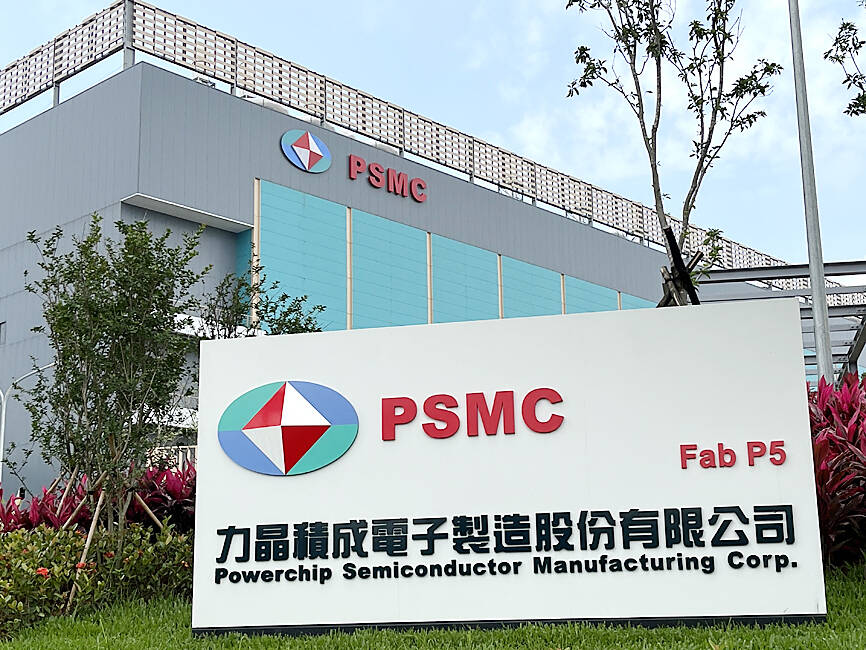Chipmaker Powerchip Semiconductor Manufacturing Corp’s (力積電) losses narrowed last quarter thanks to investment gains on technology transfer, the company said on Tuesday.
During the March quarter, Powerchip lost NT$1.1 billion (US$33.9 million), compared with losses of NT$1.5 billion in the previous quarter. That was the sixth quarterly loss in a row.
The company attributed the improvement to an investment gain of NT$1.68 billion from India’s Tata Electronics Pvt Ltd. Last year, Powerchip inked an agreement with Tata to help build India’s first 12-inch chip manufacturing facility by providing Tata with access to its mature technology nodes.

Photo: Grace Hung, Taipei Times
Powerchip’s gross margin improved to minus-4.8 percent last quarter from minus-11 percent in the prior quarter, after its factory utilization rate rose to 73 percent, the company said.
The US’ tariffs policy would not significantly impact the company’s business, as it only sends sample wafers to US customers, Powerchip president Martin Chu (朱獻國) said at an online earnings conference.
The uncertainty about the tariff war would still weigh on the company’s business outlook, Chu said.
“We have received rush orders since the beginning of this year. We are still seeing some in April, but the visibility blurs for May and June, indicating customers are likely taking a wait-and-see attitude,” Chu said.
European and US customers contributed 24 percent to its revenue last quarter, up from 18 percent in the previous quarter, while Taiwan remained the biggest revenue source, making up 53 percent of the total, the company said.
The company continues its transformation efforts to focus more on power management chips and less on DRAM chips, aiming to boost power management chip revenue to account for 40 percent of total revenue this year and eventually 60 percent, Chu said.
Last quarter, power management chips accounted for 23 percent of total revenue, he said.
Powerchip said its new fab in Miaoli County’s Tongluo Science Park (銅鑼科學園區), which has an installed capacity of 85,000 12-inch wafers a month, has not reached economic scale yet.
The company plans to spend US$453 million on new facilities and equipment this year, it said.

Taiwan Semiconductor Manufacturing Co (TSMC, 台積電) last week recorded an increase in the number of shareholders to the highest in almost eight months, despite its share price falling 3.38 percent from the previous week, Taiwan Stock Exchange data released on Saturday showed. As of Friday, TSMC had 1.88 million shareholders, the most since the week of April 25 and an increase of 31,870 from the previous week, the data showed. The number of shareholders jumped despite a drop of NT$50 (US$1.59), or 3.38 percent, in TSMC’s share price from a week earlier to NT$1,430, as investors took profits from their earlier gains

In a high-security Shenzhen laboratory, Chinese scientists have built what Washington has spent years trying to prevent: a prototype of a machine capable of producing the cutting-edge semiconductor chips that power artificial intelligence (AI), smartphones and weapons central to Western military dominance, Reuters has learned. Completed early this year and undergoing testing, the prototype fills nearly an entire factory floor. It was built by a team of former engineers from Dutch semiconductor giant ASML who reverse-engineered the company’s extreme ultraviolet lithography (EUV) machines, according to two people with knowledge of the project. EUV machines sit at the heart of a technological Cold

Taiwan’s long-term economic competitiveness will hinge not only on national champions like Taiwan Semiconductor Manufacturing Co. (TSMC, 台積電) but also on the widespread adoption of artificial intelligence (AI) and other emerging technologies, a US-based scholar has said. At a lecture in Taipei on Tuesday, Jeffrey Ding, assistant professor of political science at the George Washington University and author of "Technology and the Rise of Great Powers," argued that historical experience shows that general-purpose technologies (GPTs) — such as electricity, computers and now AI — shape long-term economic advantages through their diffusion across the broader economy. "What really matters is not who pioneers

TAIWAN VALUE CHAIN: Foxtron is to fully own Luxgen following the transaction and it plans to launch a new electric model, the Foxtron Bria, in Taiwan next year Yulon Motor Co (裕隆汽車) yesterday said that its board of directors approved the disposal of its electric vehicle (EV) unit, Luxgen Motor Co (納智捷汽車), to Foxtron Vehicle Technologies Co (鴻華先進) for NT$787.6 million (US$24.98 million). Foxtron, a half-half joint venture between Yulon affiliate Hua-Chuang Automobile Information Technical Center Co (華創車電) and Hon Hai Precision Industry Co (鴻海精密), expects to wrap up the deal in the first quarter of next year. Foxtron would fully own Luxgen following the transaction, including five car distributing companies, outlets and all employees. The deal is subject to the approval of the Fair Trade Commission, Foxtron said. “Foxtron will be